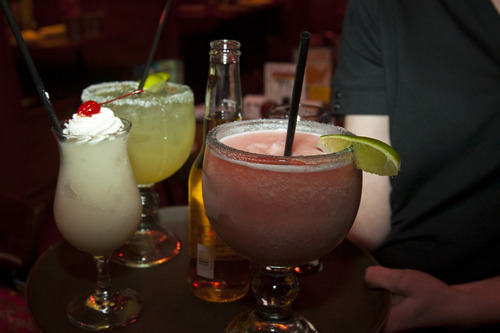This is an archived article that was published on sltrib.com in 2013, and information in the article may be outdated. It is provided only for personal research purposes and may not be reprinted.
Utah lawmakers are considering a bill to clarify Utah liquor laws to make it clear diners are allowed to look at menus while sipping alcoholic beverages without first placing on order of food.
HB218 also would create a separate liquor license category for fine-dining restaurants, which state law now puts in the same category with public bars, for which permits are scarce.
The House Business and Labor Standing Committee unanimously approved the bill earlier this week and sent it to the full House after several legislators complained about the complex and confusing nature of Utah's liquor laws.
The bill's sponsor, Rep. Gage Froerer, R-Huntsville, noted that when it comes to unraveling convoluted laws, "we have to take baby steps."
Earlier this year, the Utah Department of Alcoholic Beverage Control created an uproar after it warned restaurants that, because of agency's interpretation of state law, they would be in violation if they served alcohol to diners perusing menus or before they were seated at tables, even with reservations. A wave of citations was issued.
After a public outcry, the agency's director said there had been a misunderstanding about the directive and that the customers were allowed to be served so long as they signaled an intent to order food. Even so, the warning has had a chilling effect on the industry. Restaurants such as Chili's Grill & Bar in downtown Salt Lake City still will not serve alcoholic beverages until diners actually place an order.
Froerer hopes to clear up the confusion once and for all.
HB218, which is backed by the tourism industry, also would separate fine-dining restaurants from public bars when it comes to issuing liquor licenses.
There is such a shortage of permits that 19 applicants are on a waiting list — and some have been there for longer than a year. The proposed legislation would make 25 more licenses available by converting unused permits for reception centers — which are not required to serve food — into fine-dining permits. There would be no additional licences for public bars.
Population quotas determine the number of available liquor licenses.
Froerer said fine-dining clubs where meals are served, such as Ruth's Chris Steak House and the New Yorker, should have their own category of licenses instead of being lumped together with public bars, which are not required to serve food.
HB218 also would allow fraternal organizations and veterans groups to open their eateries to the public.
twitter@DawnHouseTrib —
Utah liquor laws' fine lines can be confusing
HB218 would create a separate license category for fine-dining restaurants, which for now are in the same "club" category as public bars. There's a third category for all other types of restaurants. Here are some distinctions between these establishments:
Fine dining • Some upscale eateries, such as Ruth's Chris Steak House, hold dining-club permits. Minors are allowed if accompanied by an adult, and drinks are allowed with or without meals. Overall food-to-alcohol receipts must be 60/40, respectively.
Bars • Establishments such as Liquid Joe's in Salt Lake City are classified as social clubs. No minors are allowed and no food orders are required to imbibe.
Restaurants • Other eateries, such as Market Street Grill, fall into the restaurant category. Food-to-alcohol receipts must be 70/30, respectively. Diners are allowed to order alcohol-based drinks only when food is served. In addition, restaurants that have opened since January 2010 must keep bartenders and open liquor bottles hidden from public view.
Source • Utah Department of Alcoholic Beverage Control.



